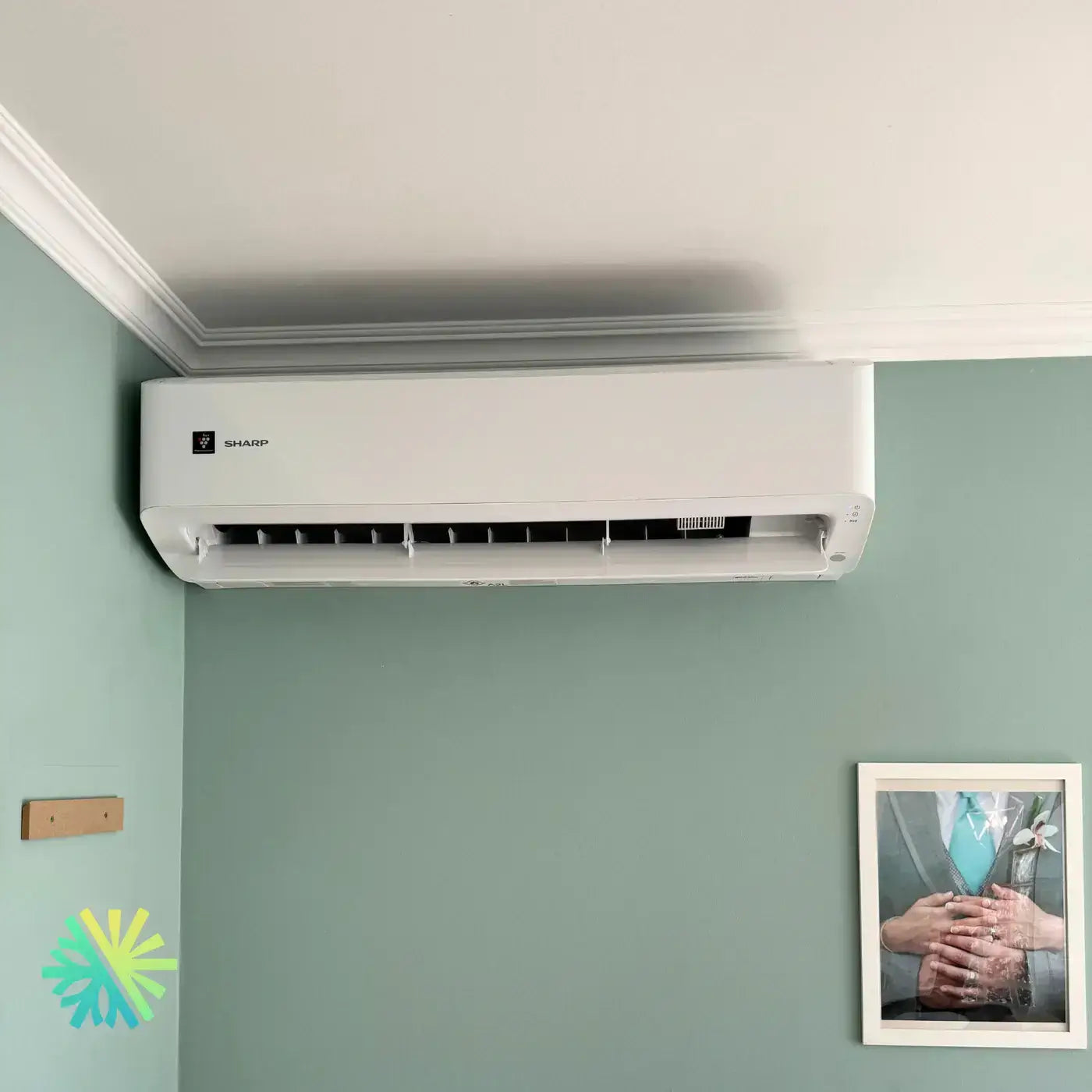The shift towards more efficient heating systems has become a central issue for many homeowners in Montreal, Laval, Longueuil, and the North and South Shores. In this crucial decision, homeowners often find themselves choosing between a wall-mounted heat pump, a modern, energy-efficient, and versatile device, and traditional electric heating, which is older and less efficient. In this article, we will deeply compare these two systems, their advantages, disadvantages, and, more importantly, their performance in Quebec's climate.
Introduction: The Rise of Wall-Mounted Heat Pumps
Wall-mounted heat pumps have become increasingly popular in Quebec households, particularly in Montreal, where winters are long and harsh. Offering an efficient heating solution, and often cooling in the summer, they present a more cost-effective and eco-friendly alternative to traditional electric heating. At AirGreen, we have witnessed growing adoption of these units due to their superior energy efficiency and the opportunity to benefit from subsidies like those offered by Hydro-Québec.
Wall-Mounted Heat Pump: A Long-Term Investment
Wall-mounted heat pumps, such as those offered by renowned brands like Fujitsu and Gree, have become popular choices due to their energy efficiency. A heat pump works on the principle of thermal inversion, allowing not only heating but also cooling your home, depending on the season. These systems use modern technologies to provide comfortable heating while consuming much less energy than traditional electric heaters.
Advantages of Wall-Mounted Heat Pumps
-
Energy Efficiency: Wall-mounted heat pumps consume significantly less energy than traditional electric heating. They can generate several units of heat for every unit of energy used, making them much more efficient.
-
Year-Round Comfort: These units provide both heating in the winter and cooling in the summer. This makes them an all-in-one solution, ideal for Quebec’s varied climate.
-
Subsidies and Tax Credits: One of the main reasons heat pumps are a popular choice is the availability of subsidies like the LogisVert program from Hydro-Québec, which significantly reduces the initial installation cost.
-
Environmental Impact: By reducing energy consumption and producing fewer greenhouse gases, heat pumps contribute to a healthier environment.
-
Long-Term Savings: While the initial cost of purchasing and installing a heat pump is higher than traditional electric heating, the energy savings over several years help to make this investment worthwhile.
Disadvantages of Wall-Mounted Heat Pumps
-
High Initial Cost: The installation of a wall-mounted heat pump is a significant investment. However, this cost is largely offset by the energy savings in the long run.
-
Complex Installation: Installing a heat pump requires a qualified professional, which may lead to additional costs. However, experts like those at AirGreen ensure a quick and hassle-free installation.
-
Noise: While modern units are much quieter, some wall-mounted heat pumps can generate a slight noise, especially at maximum power.
Traditional Electric Heating: A Classic and Simple System
Traditional electric heating is a system that uses electricity to heat the air in a room. There are several types of electric heaters, including convectors, baseboard heaters, and radiators. Although it is more affordable at the point of purchase, this system is becoming less popular due to its inefficiency.
Advantages of Traditional Electric Heating
-
Low Installation Cost: Traditional electric heaters are relatively inexpensive to install, making them an immediate and cost-effective solution for homeowners on a tight budget.
-
Simplicity: Electric heaters are easy to use and maintain. They don’t require complex systems or regular maintenance, which is an advantage for those seeking a hassle-free solution.
Disadvantages of Traditional Electric Heating
-
High Energy Consumption: Compared to heat pumps, electric heaters are extremely energy-intensive. This can result in very high electricity bills, especially in winter when the system runs at full capacity.
-
Non-Modular Heating: Unlike a heat pump, which adjusts according to outdoor temperatures, traditional electric heating continuously heats at the same intensity, leading to inefficient energy use.
-
Environmental Impact: Electricity in Quebec is primarily produced from non-renewable energy sources, meaning traditional electric heaters can have a higher environmental impact, even though heat pumps are considered more eco-friendly.
Performance Comparison: Heat Pump vs Traditional Electric Heating
| Criteria | Wall-Mounted Heat Pump | Traditional Electric Heating |
|---|---|---|
| Initial Cost | Higher, but eligible for subsidies | Lower upfront cost, but costly long-term |
| Energy Efficiency | Very high, several units of heat per unit of energy | Low, operates at full power continuously |
| Comfort in Summer | Offers cooling in addition to heating | No cooling option |
| Maintenance | Requires periodic professional maintenance | Easy to maintain, but less durable |
| Durability | Long lifespan, especially with proper maintenance | Limited lifespan |
| CO2 Emissions | Lower emissions due to reduced energy consumption | Higher emissions related to electricity use |
Conclusion: Why Choose a Wall-Mounted Heat Pump?
In the end, although traditional electric heating may seem like a more affordable option in the short term, it quickly becomes much more expensive and less efficient than wall-mounted heat pumps. Indeed, the advantages of the heat pump, including its versatility, energy efficiency, and lower environmental impact, make it an ideal solution for homes in Montreal, Laval, Longueuil, and the North and South Shores. Installing a wall-mounted heat pump is a smart investment that provides optimal comfort year-round, reduces energy bills, and contributes to environmental preservation.
At AirGreen, we help you make the best choice for your needs and budget, with professional installations and high-quality after-sales service. Don’t hesitate to contact us for a personalized quote and take advantage of available subsidies to make your energy transition even more affordable.

